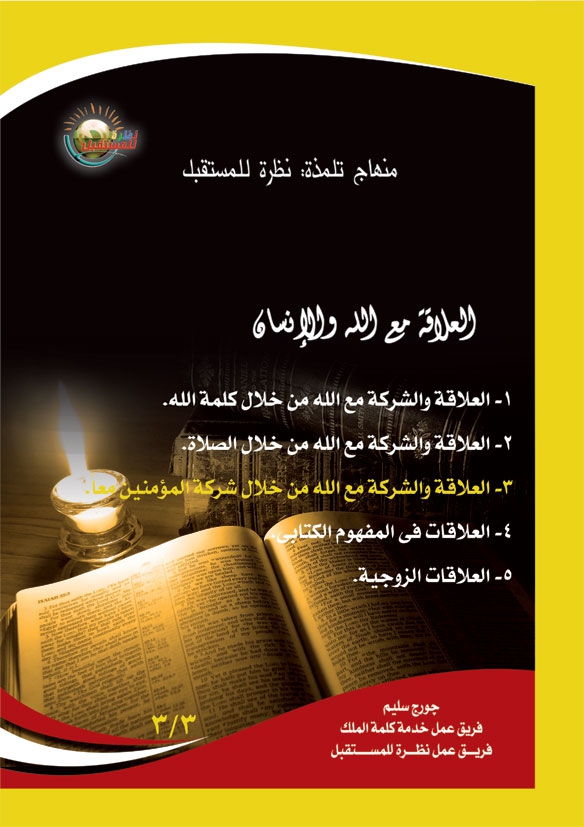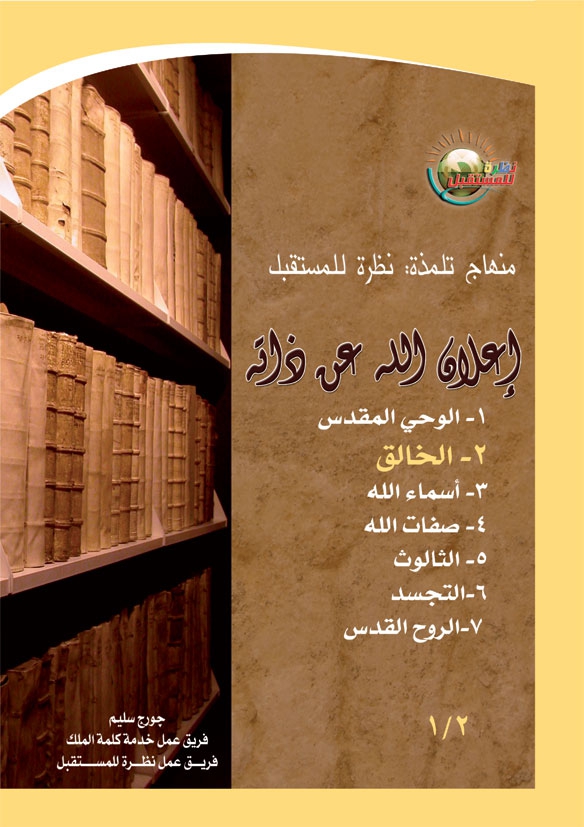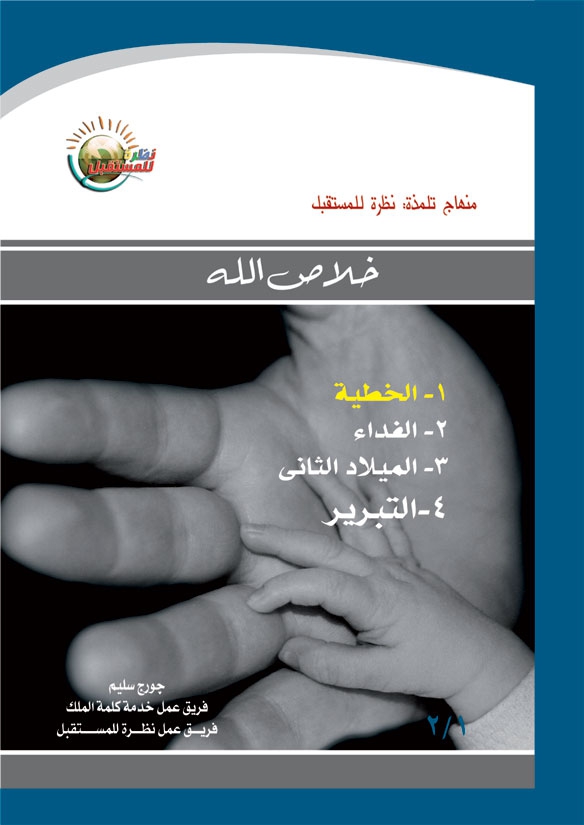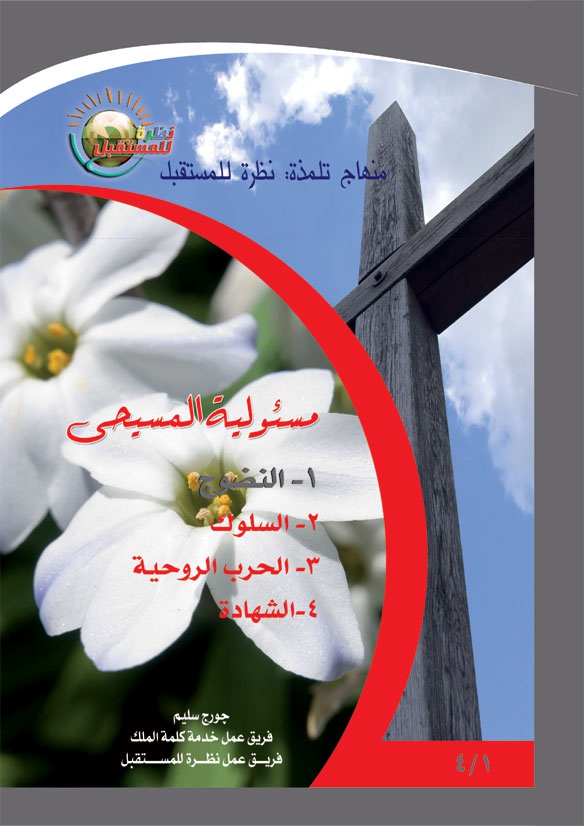Discipleship Curricula
Making disciples is the system followed by Christ from the beginning of his ministry with the twelve disciples, and again, later, with the seventy apostles. The practice of discipleship is not one of the various ways that we can choose to use, it is the only way, and the solution for preparing every new generation of believers for ministry and leadership, to influence the lives of others—because Jesus Christ himself used discipleship. This curriculum aims to help new believers grow in their spiritual life.
Relationship between God and Humanity
Author: Mr. George Selim
Publisher: Vision For Future
Traces relationship and fellowship with God through five sections:God's Word
“Keep this Book of the Law always on your lips; meditate on it day and night, so that you may be careful to do everything written in it. Then you will be prosperous and successful.”
(Joshua 1:8)
Spiritual knowledge is available today for every one of God’s children. Growth is not a heavy duty, but it is a privilege. We need to study the Word of God regularly and apply what we have learned. It will require us to read, contemplate, memorize, and apply the Bible. Reading sections of the Bible daily is the simplest way to interact with Scripture. We need to read, to understand and give attention to God’s Word. One of the best ways to read the Bible is to assign a certain time and identify a place for reading the Scripture, allowing the reading of God’s Word to become a daily and indispensable habit. Further, it is preferable to read the Old and New Testaments together, in a systematic way, and not to read randomly. Some people neglect to read the Word of God because they have lost their spiritual appetite, or because of worldly concerns and flimsy excuses, like that they lack time, are too busy, or have trouble understanding the Bible.
Meditating on the Word of God means carefully reading and thinking about each verse, each word and each situation. Meditation is the opposite of superficial reading, which does not lead to knowledge or fruit. Interpretation of each verse is not intended, but what is most important is to apply the Word of God, to allow it to light your way, so that it becomes like the food that feeds you throughout the day. Time and effort are needed to study the Word of God well, which will lead you to a solid foundation and building, or growth. We study the word of God in order to obey the divine commands, and to know right teaching from false, to reach spiritual maturity, to enjoy intellectual openness, and to understand the true meaning of life. A basic rule for Bible study includes comparison, analysis, and deduction. To study any part in the Bible, you should follow three steps: (1) identify the topic of the chapter, (2) draw principles, and (3) ask questions to apply it.
Beyond this, memorizing God’s Word is a fourth part of this way of life, which requires good organization and concentrated training. Memorization helps us in our spiritual growth and in our life of prayer, and it helps us to always be prepared to give an answer to others’ questions about Christ. Further, it assists us in responding to the devil’s temptations and in sharing our faith with others.
Our ability to live faithfully according to how God has fed us in His Word evidences that we are benefiting from these four steps.
Prayer
“Before they call I will answer; while they are still speaking I will hear.”
(Isaiah 65:24)
Prayer is to approach God with an open heart and to talk with him in fellowship, love and appreciation. The Bible says, “You will seek me and find me when you seek me with all your heart” (Jeremiah 29:13). Prayer should be wholehearted, because we pray to the God whose heart is open to us, and full of love and mercy. We pray in secret to God the Father, who loved us and sent His Son Jesus Christ to redeem us. God hears us very well. He knows and understands us completely—more than we know and understand ourselves. He welcomes us in his divine presence, though that presence requires all who enter to be full of awe and holiness. For this reason, we enter through the Lord Jesus Christ, the only mediator, because: He is the Word of God; He is one with the Father and is not separated from Him at all; He is the only perfect man who was able to please God completely with his life—he obeyed all of God’s commandments; And he is alive now and seated at the right hand of God in the heaven after achieving victory over death.
There are many kinds of prayers: thanksgiving, praise, surrender, submission, trust, victory, confession, repentance, cleansing, needs, and intercession. Heartfelt prayer gives is necessary because it alone reveals the deep things in our hearts and makes us ready to receive a word from God, who always answers the prayers of a humble and honest person. When we enter into God’s presence, there should be no rush to speak. We should not repeat requests. We should communicate with God daily, with faith, gentleness, joy, and love.
We should also get rid of things that prevent the answering of our prayers, such as sins that are not repented of, witchcraft, selfishness, ignoring others, a lack of forgiveness to others, prayer with bad intent, a strained relationship with a partner, or insults directed to someone rather than trying to correct the situation. A good purpose of prayer is to build a spiritual altar on which we present sacrifices of thanksgiving and praise to God.
Fellowship of Believers“They devoted themselves to the apostles’ teaching and to fellowship, to the breaking of bread and to prayer.”
(Acts 2:42)
The fellowship of believers is not relationships among a group that believes in certain principles, but it is relationships among a group of people who have a real relationship with Christ, and with each other, through Christ. Fellowship was one of the bases of spiritual growth in Acts 2:42. The early church practiced it because it was an important component of teaching and learning, praying, and communion.
Fellowship is shown in its essence in the brotherly-love connection which we live out and experience as God’s children together. It is also the practical application of oneness. In Ecclesiastes, God’s Word warns us of isolation and rejection because the devil tempts souls by using a lack of fellowship to destroy their faith. Scripture says, “Two are better than one, because they have a good return for their labor: If either of them falls down, one can help the other up. But pity anyone who falls and has no one to help them up” (Ecclesiastes 4:9, 10).
We see the Trinity and the Union of the Father, and of the Son, and of the Holy Spirit as a great example of fellowship. Perfect fellowship aims at harmony and agreement among the members of the body. It helps us to achieve God’s plans and to thwart the ongoing struggle against the forces of evil. The elements of successful fellowship are honesty in love, frankness, humility, real forgiveness, respect for our differences, and belonging to each other.
Christian fellowship is characterized by vitality and positivity because it promotes growth and gives spiritual comfort to our hearts and souls. It encourages us to support each other in difficult situations and to alleviate our burdens. It removes the depression of loneliness. It meets the necessary needs in life. It contributes to correcting each other's paths. It also provides opportunities for ministry.
Relationships from a Biblical Perspective“How good and pleasant it is when God’s people live together in unity!”
(Psalm 133:1)
Relationships are one of the most important and greatest gifts given by God to man in life. There are many relationships in life, such as family relationships, work relationships, church relationships, and neighborhood and friendship relationships in the community. The divine purpose for these relationships is the glorifying of God and the blessing of humanity. Relationships in human life are a very important element in forming, teaching, and shaping the human soul. God created us to have relationships with others. In order to succeed in relationships, we have to understand the nature of relationships.
We should do our best to maintain the living and fruitful gift of relationships. One of the reasons that relationships worsen or fail is a misunderstanding. We must put great effort into having all our relationships be characterized by mutual understanding, appreciation of circumstances, integrity, honesty, faithfulness, and mutual respect.
Marital Relationships
Is marriage for pleasure only? What is the basis of marriage? Is it physical pleasure, partnership or both of them? Is the marital relationship distinguished from other human relationships? Is God the Creator biased? Do we have the right to attribute inequality to him? Is it reasonable that God Most Holy creates unclean things or gives unclean gifts or has impure thoughts? Is God biased in love that He may love one person or group more than another person, or that He creates one to enslave another?
God created Adam and Eve, and they were innocent and pure. He gave each of them a powerful mind, full of potential, and a clean heart. God granted them his own presence and company. His presence made tangible the wonderful image of the heavenly Father who is in close fellowship and company with his creation. He reflected the amazing image of fellowship between God and man that was meant to be throughout daily life. We read in Genesis 2:20, "The man gave names to all the cattle, and to the birds of the sky, and to every beast of the field, but for Adam there was not found a helper suitable for him."
Next, Genesis 2:21, tells us, "So the Lord God caused a deep sleep to fall upon the man, and he slept; then He took one of his ribs and closed up the flesh at that place." We find that God created a helper from Adam's rib, which means that the helper existed inside of Adam. Woman was created from Adam by a divine act, as a complete helper.
In Genesis 2:22, we read, "The Lord God fashioned into a woman the rib which He had taken from the man, and brought her to the man." The Lord took one rib from Adam, but she was brought to him as a complete helper. God builds complete and great works.
In Genesis 2:23, "The man said, "This is now bone of my bones. And flesh of my flesh; She shall be called Woman. Because she was taken out of Man." The Hebrew word for woman is "Ishah" because she was taken out of Man "Ish." Some scholars believe that "Ishah" denotes tenderness and gentleness, while "Ish" suggests force. We see the reality of God creating a helper for Adam. This undoubtedly makes him happy, and it is clear from his words that he realized she had come out of him. He declared that she was bone of his bones and flesh of his flesh. He welcomed her and the relationship between them. He called her "woman," and not "Eve."
We note that when God created the human race, "in the image of God... male and female He created them," (Genesis 1:27, 5:1, 2; Matthew 19:4), God did not create them male only. The image of God appears in man and woman, male as female. Their special characteristics are needed to reflect the full nature of God. The word "woman" (Ishah) suggests that God granted her the sensitivity and emotions needed to help protect and progress the human race. Woman has a special sense towards man's needs, which helps her to understand instinctively people's attitudes and feelings.
In the divine order, the rule of man over women is based only on his precedence in creation, and not on preference, "But I do not allow a woman to teach or exercise authority over a man, but to remain quiet. For it was Adam who was first created, and then Eve," (1 Timothy 2:12, 13).
Does the Scripture talk about woman as one of the parties of the marital relationship?




